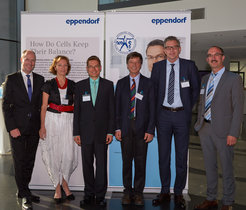Thomas Wollert receives Eppendorf Award for Young European Investigators

How do cells get rid of their waste?
The cells of our body face similar challenges as we do: without efficient waste disposal systems heaps of trash will accumulate over time. Human cells therefore rely on specific mechanisms to pick up cellular waste such as superfluous or damaged organelles and to deliver them to recycling facilities. Diminished performance of this cellular recycling system may cause severe disorders including Alzheimer´s disease or cancer. The research of Thomas Wollert and his team focuses on autophagy, which represents an important recycling system of the cell. During autophagy, cellular waste is captured and subsequently delivered to specialized recycling facilities, called lysosomes. Thus, autophagy protects the cell from accumulating cell debris. “The Eppendorf-Award honors our efforts to understand cellular transport mechanisms at a molecular scale,” says Thomas Wollert, group leader at the MPI of Biochemistry since 2010. “Our findings might provide the basis for the development of new therapies against cancer or neurodegenerative diseases such as Alzheimer.”
With the Eppendorf Young Investigator Award, which was established in 1995, the Eppendorf AG honors in partnership with the scientific journal Nature outstanding work in biomedical research to support young scientists in Europe up to on age of 35. The Award winner is selected by an independent committee composed of chairman Prof. Reinhard Jahn (Max Planck Institute for Biophysical Chemistry, Göttingen, Germany), Prof. Dieter Häussinger (Clinic for Gastroenterology, Hepatology and Infectiology, Düsseldorf, Germany), Prof. Maria Leptin (EMBO, Heidelberg, Germany), and Prof. Martin J. Lohse (Institute for Pharmacology and Toxicology, University of Würzburg, Germany). The award is endowed with 20,000 €.












